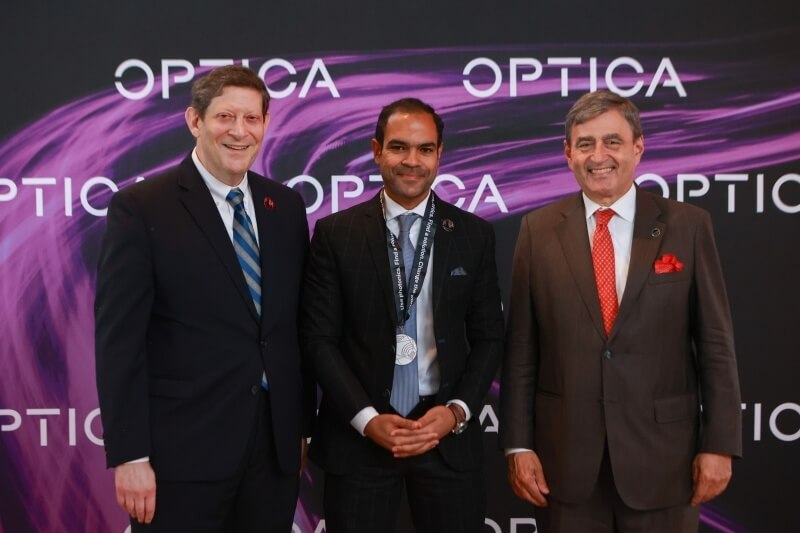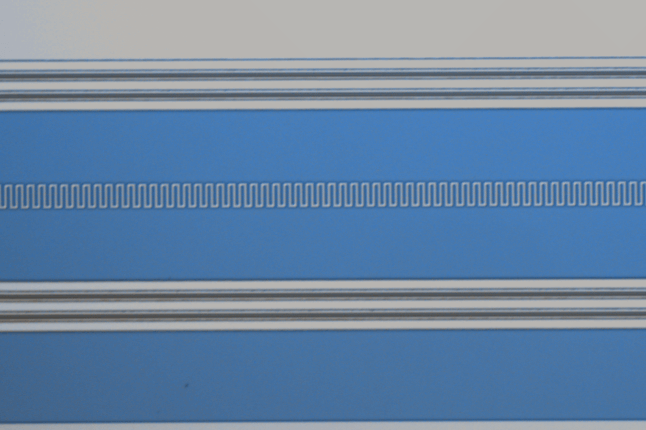News
Left to right: Prof. Alan Willner, Chair of the Optica Foundation Challenge selection committee, Andrew and Erna Viterbi Professorial Chair, and Distinguished Professor of Electrical and Computer Engineering at the University of Southern California, Dr. Ahmed Dorrah, a research associate at Harvard SEAS, and Prof. Eric Mazur, Optica Foundation President, 2017 Optica President, and the Balkanski Professor of Physics and Applied Physics at Harvard University. (Credit: Optica)
Ahmed Dorrah, a research associate at the Harvard John A. Paulson School of Engineering and Applied Sciences (SEAS) has been awarded a $100,000 grant from the Optica Foundation as part of the 2023 Optica Foundation Challenge.
The Optica Foundation recognizes ten early-career professionals with exceptional ideas to leverage optics and photonics and address global challenges. The grant will fund Dorrah’s work into developing news ways to use structured light generation and sensing with metasurfaces for terahertz (THz) communications.
“The THz range has potential to be hugely successful in free space because it holds a wider bandwidth than microwaves and can enable a new generation of wireless communications, including 6G,” said Dorrah, who is a postdoctoral fellow in the lab of Federico Capasso, the Robert L. Wallace Professor of Applied Physics and Vinton Hayes Senior Research Fellow in Electrical Engineering. “On an academic scale, I hope to inspire others who work with structured light in the visible range to try to develop elegant and affordable techniques for structuring light in the THz regime.”
As a research associate in the Capasso Lab, Dorrah has helped build metasurfaces that can create, control and shape optical singularities, manipulate and control the polarization of light and harness the power of structured light over space with possible application to holography.
As part of the Optical Foundation Challenge, Dorrah will design, model and test new metasurfaces that can convert any 1D THz power detector array to a full 2D wavefront camera for capturing light signals, which would enable the full reading of the THz beam profile with high resolution and over broadband.
To achieve these goals, Dorrah will collaborate with Paul Chevalier and Dipa Ghindani in the Capasso lab along with the group of Nader Engheta, the H. Nedwill Ramsey Professor at the University of Pennsylvania.
Ying Xue, Hong Kong University of Science and Technology, Hong Kong, was also awarded the prize.
“As the demand for new technology scales, networks have to keep up with the pace of growth, and issues continue to arise related to the efficient, safe, and cost-effective flow of data and information,” said Alan Willner, chair of the Challenge Selection Committee. “Drs. Dorrah and Xue are attacking this fundamental issue from differing, but highly thoughtful, perspectives, including eliminating the limitations associated with free space optics and photonic integrated circuits."
Topics: Applied Physics
Cutting-edge science delivered direct to your inbox.
Join the Harvard SEAS mailing list.
Press Contact
Leah Burrows | 617-496-1351 | lburrows@seas.harvard.edu



